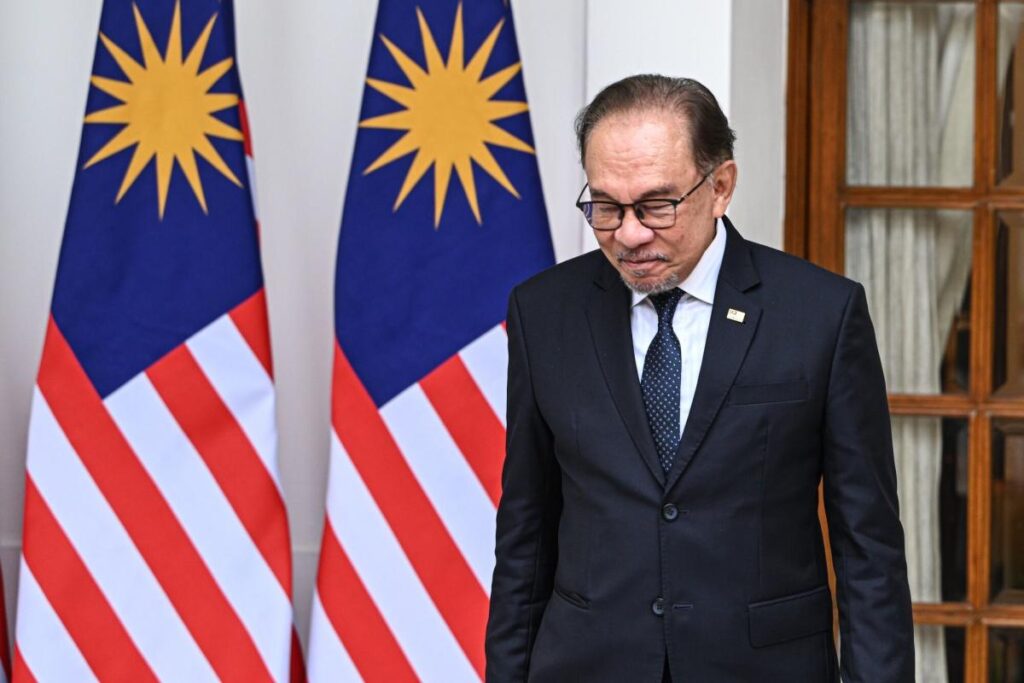(Bloomberg) — Malaysia ended 2024 on a roll: its economy grew faster than official forecasts, its currency was the best performer in emerging markets and, after an extended period of political turmoil, its government stayed intact for a second full year.
Most Read from Bloomberg
Sustaining that momentum is a priority for Prime Minister Anwar Ibrahim, but the challenges to that vision are quickly piling up.
For starters, US President Donald Trump’s early moves to boost tariffs has Malaysian businesses bracing for inflationary pressures at home and abroad. That’s a global worry, but the hit that tariffs are expected to deliver to Malaysia’s exports — and growth — could quickly undermine Anwar’s plans to reduce the deficit by slashing subsidies for things like gasoline.
“It will be a challenging year ahead for most economies, especially small, export-oriented ones like Malaysia, facing both growth downsides and inflationary pressures,” said Adib Zalkapli, the founder of Viewfinder Global Affairs, a regional geopolitical consultancy.
Malaysia’s final report on gross domestic product released Friday showed the economy expanded 5.1% last year, and 5% in the final three months of 2024, driven mainly by domestic demand, according to the nation’s central bank. That’s below the 5.3% expansion in July to September, marking a second straight quarter of slower growth. Now headwinds from Trump’s election are set to build.
It wasn’t supposed to be this way. Well positioned along one of the world’s busiest waterways for trade, Malaysia has capitalized on the global shift of supply chains away from China. The $400 billion economy has long welcomed technology companies including Intel Corp., but in recent years it’s seen an influx of investment for things like data centers and chip manufacturing that have helped make it a world leader.
Read: Malaysia Sees GDP Growth Above 5% Despite Trump Tariff Risks
Late last year, Anwar and Singapore Prime Minister Lawrence Wong presided over a ceremony cementing the establishment of a special economic zone linking their two nations’ border region that is meant to help accelerate investments. The momentum from all that good news helped the ringgit strengthen 2.7% against the dollar while nearly all other emerging market currencies declined.
Anwar has acknowledged the challenges ahead and argued that Malaysia can sustain its growth rate and keep inflation manageable even with the threat of a potential trade war. He vowed this month to aggressively explore trade opportunities with other countries, including in Africa and Latin America.
Story Continues
“Going forward, while the global environment could be challenging, growth of the Malaysian economy will be driven by robust expansion in investment activity, resilient household spending and expansion in exports supported by Malaysia’s strong economic fundamentals,” BNM Governor Abdul Rasheed Ghaffour said in a statement on Friday.
Read: Trump Moves to Impose Reciprocal Tariffs as Soon as April
But for now, the country’s main manufacturing association is warning that tougher times lie ahead. On Thursday Trump ordered his administration to consider imposing reciprocal tariffs on numerous trading partners, with a global review due in April.
In Malaysia, the removal of fuel and energy subsidies, coupled with rising tariffs and supply chain disruptions could “raise operational costs and erode consumer purchasing power,” the Federation of Malaysian Manufacturers said in a statement to Bloomberg.
Anwar has long planned to cut fuel subsidies starting mid-year in an effort to save as much as 8 billion ringgit ($1.8 billion), easing the fiscal deficit. His government removed blanket diesel subsidies last year. Electricity tariffs are also expected to be raised later this year.
Read: Trump’s Eye-for-Eye Tariff Threat Risks New Asia Flashpoints
Yet the gloomier global outlook — combined with a key state election in Malaysia — may pressure Anwar to delay full implementation of that proposal.
It’s not just the big manufacturers who are worried.
Smaller businesses also have a “very challenging” outlook, although they are more concerned with cost pressures at home rather than the impacts of Trump’s presidency, according to Chin See Seong, the president of SME Association of Malaysia — the body representing small and medium-sized enterprises.
Read: Malaysia Central Bank Says Ready to Curb Ringgit Volatility
If there is a bright spot, it’s that Trump has a slew of bigger targets on his list. Malaysia’s $26 billion trade surplus with the US puts it at risk, but that’s far less than other Asian nations including Vietnam, South Korea and India. And Malaysia has the benefit of continuing to look like a relatively affordable alternative to China — whose nearly $300 billion surplus with the US put it at the top of Trump’s list — as supply chains continue to shift.
“Companies trying to better manage the US tariff impacts on China and potentially on other Southeast Asian countries may invest in more value-added activities in Malaysia,” Adib said.
–With assistance from Niluksi Koswanage.
(Updates with final GDP numbers in fifth paragraph, comments from central bank governor in ninth paragraph.)
Most Read from Bloomberg Businessweek
©2025 Bloomberg L.P.


